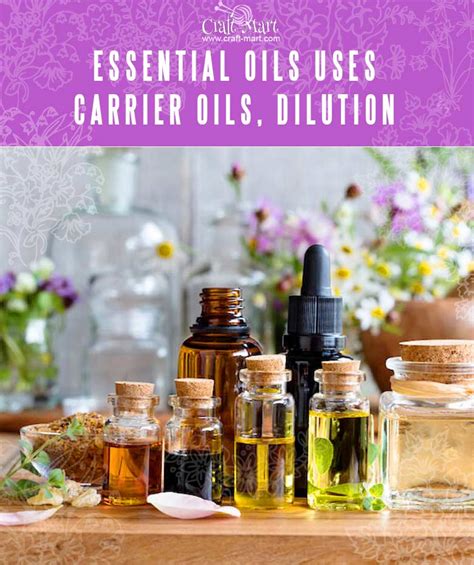What are Carrier Oils?
Carrier oils, also known as base oils, are colorless, odorless oils that are used to dilute essential oils. Essential oils are highly concentrated plant oils that are extracted through distillation or cold pressing. They are very potent and can cause skin irritation if applied undiluted.

Carrier oils help to dilute essential oils, making them safe for topical application. They also help to extend the shelf life of essential oils and improve their absorption into the skin.
9 Most Popular Carrier Oils for Essential Oils
-
Jojoba oil: Jojoba oil is a liquid wax that is very similar to the sebum produced by the skin. It is lightweight, non-greasy, and hypoallergenic. Jojoba oil is a good choice for all skin types, especially sensitive skin.
-
Sweet almond oil: Sweet almond oil is a light, nutty-scented oil that is rich in vitamins and minerals. It is a good choice for all skin types, including dry, sensitive, and mature skin.
-
Fractionated coconut oil: Fractionated coconut oil is a lighter, less greasy version of coconut oil. It is odorless and colorless, and it is a good choice for all skin types.
-
Grapeseed oil: Grapeseed oil is a light, non-comedogenic oil that is rich in antioxidants. It is a good choice for oily and acne-prone skin.
-
Argan oil: Argan oil is a rich, luxurious oil that is high in vitamin E and fatty acids. It is a good choice for dry, mature, and sensitive skin.
-
Avocado oil: Avocado oil is a thick, creamy oil that is rich in vitamins, minerals, and antioxidants. It is a good choice for dry, mature, and sensitive skin.
-
Rosehip oil: Rosehip oil is a light, reddish-orange oil that is rich in vitamins, antioxidants, and essential fatty acids. It is a good choice for all skin types, especially dry, mature, and sensitive skin.
-
Sunflower oil: Sunflower oil is a light, non-greasy oil that is rich in vitamins and minerals. It is a good choice for all skin types, especially oily and acne-prone skin.
-
Olive oil: Olive oil is a thick, rich oil that is high in vitamins and antioxidants. It is a good choice for dry, mature, and sensitive skin.
What to Look for When Choosing a Carrier Oil
When choosing a carrier oil, it is important to consider your skin type, the essential oil you are using, and the desired effect.
- Skin type: If you have dry skin, choose a rich, moisturizing oil such as argan oil or avocado oil. If you have oily skin, choose a light, non-comedogenic oil such as grapeseed oil or sunflower oil.
- Essential oil: Some essential oils are more soluble in certain carrier oils. For example, citrus oils are more soluble in grapeseed oil, while floral oils are more soluble in jojoba oil.
- Desired effect: If you are using essential oils for aromatherapy, choose a carrier oil that has a neutral scent. If you are using essential oils for topical application, choose a carrier oil that has therapeutic properties that complement the essential oil.
How to Dilute Essential Oils with Carrier Oils
To dilute essential oils with carrier oils, simply add a few drops of essential oil to a small amount of carrier oil. The ratio of essential oil to carrier oil will vary depending on the desired effect.
- For topical application: A 2-5% dilution is generally recommended for topical application. This means adding 2-5 drops of essential oil to 10 ml of carrier oil.
- For aromatherapy: A 1-2% dilution is generally recommended for aromatherapy. This means adding 1-2 drops of essential oil to 10 ml of carrier oil.
Benefits of Using Carrier Oils with Essential Oils
Using carrier oils with essential oils offers several benefits, including:
- Dilution: Carrier oils help to dilute essential oils, making them safe for topical application.
- Extended shelf life: Carrier oils help to extend the shelf life of essential oils.
- Improved absorption: Carrier oils help to improve the absorption of essential oils into the skin.
- Therapeutic properties: Carrier oils have their own therapeutic properties that can complement the benefits of essential oils.
Applications of Carrier Oils with Essential Oils
Carrier oils and essential oils can be used for a wide variety of applications, including:
- Aromatherapy: Carrier oils can be used to dilute essential oils for aromatherapy. This is a great way to enjoy the benefits of essential oils without having to apply them to the skin.
- Topical application: Carrier oils can be used to dilute essential oils for topical application. This is a great way to use essential oils for massage, skincare, and hair care.
- Diffusing: Carrier oils can be used to diffuse essential oils. This is a great way to enjoy the benefits of essential oils in your home or office.
- Inhalation: Carrier oils can be used to inhale essential oils. This is a great way to enjoy the benefits of essential oils if you have respiratory problems.
